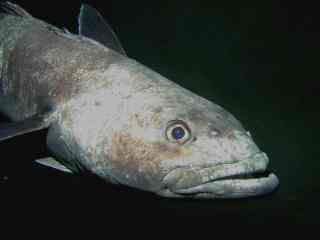Antarctic cod
From Wikipedia, the free encyclopedia
[Photo] A specimen of Dissostichus mawsoni the Antarctic toothfish (Notothenioidei, Nototheniidae)captured and photographed underwater in McMurdo Sound, Antarctica. This fish was approximately 100 lbs. D. mawsoni is closely related to and resembles D. eleginoides, commonly called the Chilean Sea Bass, and both fishes are probably marketed under that name. Both species may be at risk for overfishing. Photograph by Paul Cziko, supported by US-NSF through the DeVries-Cheng Lab at the University of Illinois, Urbana-Chamnpaign
The Antarctic Cod Dissostichus mawsoni, of the fish family Nototheniidae, is famous for producing antifreeze glycoprotein that allows it to survive in the ice-laden waters of the Southern Ocean surrounding Antarctica. Also called the Antarctic toothfish, with a heartbeat once every six seconds, research involving Antarctic cod may lead to advances in cardiac medicine involving conditions where human hearts beat slowly during certain medical procedures or fail to beat fast enough due to hypothermia.
Despite its name, the Antarctic Cod is quite unrelated to the true cod; it is not even in the same order, being classified as a perciform rather than a gadiform.
These large fish are probably mesopelagic and have been caught in waters deeper than 2000 meters. Fully grown, these grayish fish are among the biggest in the Antarctic, adults of more than 2 meters in length and weighing over 135 kilograms have been recorded during New Zealand research work carried out in the Ross Sea. The flesh is white with a high oil content. The taste is said to be similar to cod, which led to the common name Antarctic Cod. Their primary predators are the Weddell seal, the leopard seal, and Orca. They are closely related to, and sometimes confused with, the Patagonian toothfish Dissostichus eleginoides.
Antarctic cod are probably the main fish predator in Antarctic waters; occupying the ecological niche of sharks in more temperate seas. They are generally piscivorous (fish-eaters) but are known to eat almost anything including the remains of penguins caught by seals and orca on the surface.
Antarctic Cod have a lightweight cartilaginous skeleton, lack a swim bladder, and have fatty deposits which allow them to live in middle level waters. They also have retinas that are well adapted to the low light levels since snow and ice on the surface of the ocean, even in summer, reduces light levels to that of the great depths in the open oceans. Coloring is black to olive brown and lighter on the undersides. They have a broad head, narrow body, two fins running along the back and belly, large pectorial fins, and an additional small fin in front of the back fin. Its distribution range is generally below 65 degrees South. It is mainly caught in the Ross Sea in the austral summer but has also been recorded from Antarctic coastal waters south of the Indian Ocean sector, in the vicinity of the Antarctic peninsula, and near the South Sandwich Islands. Antarctic toothfish is managed by CCAMLR the Convention for the Conservation of Antarctic Marine Living Resources. (CCAMLR) has limited fishing to a precautionary catch level in the Ross sea, fishing takes place with the aim of collecting sufficient biological and stock size information to effectively manage this fishery in the future.
http://en.wikipedia.org/wiki/Antarctic_cod
| The text in this page is based on the copyrighted Wikipedia article shown in above URL. It is used under the GNU Free Documentation License. You may redistribute it, verbatim or modified, providing that you comply with the terms of the GFDL. |
|

